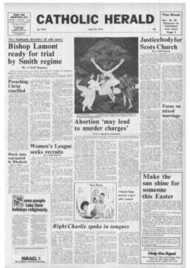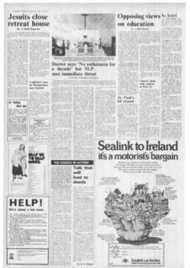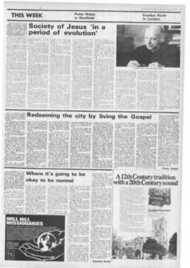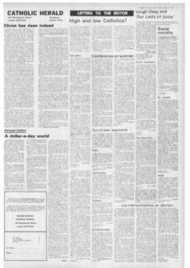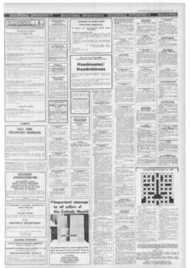Page 3, 19th April 1973
Page 3
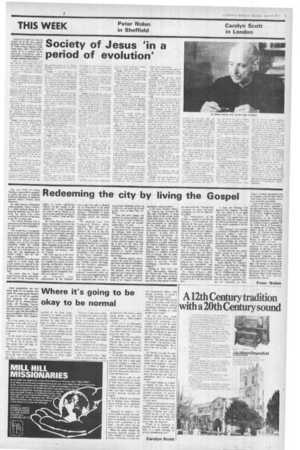
Report an error
Noticed an error on this page?If you've noticed an error in this article please click here to report it.
Tags
Share
Related articles
Liberation Gospel Spreads From Inner Cities
Third Force Moves Into The Frame
Latest Books By Dom Peter Damien
Not Strangers But Partners!
Theology Today
Redeeming the city by living the Gospel
The new field of Urban Theology, expressed in community action, has come to challenge traditional theology for failing to question today's divisive social structures.
Dr. John Vincent, a Methodist circuit preacher, whose 'College' is a small terraced house in a decaying industrial area of Sheffield, has spent four years teaching the relevance of theology to the life of urban man.
"The Urban Theology Unit is ecumenical and the first project of its sort in the United Kingdom," he said.
"We would like to re-educate clergy in two ways, the first being theological formation. Most have been taught theology as if it was information about eternal realities, never as if it was about something._ within the secular world, as are the parables. It is the office of a Christian to discover the real significance of secular events," said Dr. Vincent, a sociologist.
The second sort of re-education would he to teach clergy and social workers to respond to the needs of the communities they live in and support action projects, he said.
His course aims to "Equip social workers, clergy and others with some of the necessary in
sights to create significant ministry in the setting of the modern city." From September the subject will -be offered as an extra-mural course by the universities of London, Leeds and Birmingham.
The Urban Theology Centre is doing work similar to that of the Chicago Urban Training Centre, where Dr. Vincent has studied. The Sheffield I nit began after an ecumenical consultation attended by 50 priests, ministers and sociologists at Champness Hall, Rochdale, Lancashire, in 1969. It grew out of a research project which originally proposed the setting up of a 'North-West Institute for Religion and Society', said Dr. Vincent.
The Unit runs six to 10 week courses throughout the year, directed by Dr. Vincent, assisted by a number of experts in social planning, architecture, education and related subjects, as well as frequent conferences. The work is supported by the Methodist Mission and students' fees.
Dr. Vincent's own achievements in the Pitsmoor area, where the unit is situated are an illustration of his belief about theology summed up in his remark: "Christianity is about the hidden dynamic for wholeness working within the secular world."
The Sheffield Inner City Ecumenical Mission, whose magazine 'Here and Now' is edited by Dr. Vincent, coordinates the work of the free churches in the area and is linked to the Ashram Community.
Ashram, run by Dr. Vincent, is a group of six people who have committed themselves to "living, ministering and worshipping together in the inner-city area who seek to he part of the local community." They include some of the Unit's students. The Theology Unit's own committee includes two Catholic priests and two Catholic laymen and helps link the Pitsmoor community even more closely together.
A counselling centre and a proposed ecumenical tentre are some of the more tangible fruits of thoe cooperation. But Dr. N'incent emphasised the various ac
tion groups which have grown up in the area, are made up of local people, many of them West Indians.
"You will never change any situation by going straight to the top, you have to start at the bottom, where people are actually getting hurt," he said.
One of the major successes of the growing sense of community is the dialogue which has begun between the planners and the people they are planning for. This started with the Pitsmoor Action Croup, aided by experts, drawing up a plan for the area and criticising that proposed by the authorities. The initiative has resulted in regular meetings between the planners and the Action Group.
The Pitsmoor group's survey showed the need for playspace and shops and demonstrated those living in the area considered themselves ignored by the council. The planners were told traffic appeared more important to them than people and their original proposals were found, point by point, to be "largely irrelevant, doctrinaire and premature."
In his book 'Secular Christ', Dr. Vincent has developed his idea that Christianity is about those things in the secular world which help man towards liberation and wholeness. He describes most theologians as "apologists for the status quo" and maintains: "The Church has tried to make out of the Gospel a theology of power." In June, 1972, an Ecumenical Consultation, involving over 30 clergy was organised by the Unit. The paper published as a result stated that the Church existed to encourage religion, but poured resources into religious objects such as buildings, or religious exercises such as services. But the paper concluded: "Christianity is concerned with the Kingdom of God, which is action, deeds, techniques, intentions, cornmitment."
Writing in 'New City', the Unit's thrice-yearly magazine, Dr. Vincent said: "The city is the place where the human is lost in the mass, where the individual must fit into other people's worlds for most of his life." In some tiny segment he may' advance something, or even be someone, he added.
The "wickedness" of the system or people is irrevelevant because "Christendom has allowed all the great questions about life to be decided all but automatically. And the system which Christendom now supports has now become man's master." For the city it means humanity will survive in it "only as a biproduct", as it was not created for human beings as such, but for productivity or profit, he said.
Dr. Vincent sees the -application of' Urban Theology in allowing expression for man's need for identity, through creative activity and through belonging to a community. This can be achieved by "creating areas of freedom and experiment" and utilising basic humanity to create an atmosphere for cooperation.
Fr. Donal O'Leary, while Director of the Religious Education Centre in Sheffield, attended a course at the Unit and lectured there. "I think the Theology Unit deserves every support," he said. "Us aim seems to be to apply Redemption to the city situation. " City people have cut their roots from the country and by 1980 it is estimated 75 per cent of the world's population will live in cities."
Urban Theology "is an attempt to inculcate Christianity into the industrial milieu" said Fr. O'Leary. The Catholic structure is based on the parish unit. Many are now realising the need for specialisation with such problems as housing and race-relations. Dr. Vincent caters for this.
"I think Deacons and priests should attend his courses," he said. "He has had to struggle against a lot of opposition, but I think he is winning through."
Asked whether Dr. Vincent's idea's were shared by any leading • Catholic theologians, Fr. O'Leary said Fr. Karl Rahner and Fr. Schillbeeckx and others "Wrote secular theology in the best positive sense" but Dr. Vincent was alone in specialising in the city situation, he said. Today's Catholic theologians are in sympathy with his ideas and in some areas their teaching serves as a corrective, he added.
Last month Bishop Moverley, Auxiliary of Leeds, attended a one-day conference on 'Education for Ministry' at the Unit, chaired by Dr. Price, Anglican Bishop of Doncaster. Fr. Brendan' McKeefrey of the Sheffield Religious Education Centre, and Fr. Patrick Lyons, a graduate of the Irish School of Ecumenics, are among the 32 taking a fortnight's course at the Unit this month. Dr. Vincent has lectured at the Irish School of Ecumenics in Dublin. "We are very much hoping to appoint a Catholic member of staff," he said.
Dr. Vincent's course puts the problems of today against the teachings of theology, instructs students in methods of practical social analysis and finally brings theological categories to bear upon the problems of urban man.
He himself does not believe his ideas will emerge at the level of official theology "For at least 10 years" because academic theologians know little of them. But if one judges by his success in Sheffield, the wait will be dramatically shorter.
Peter Nolan
blog comments powered by Disqus


